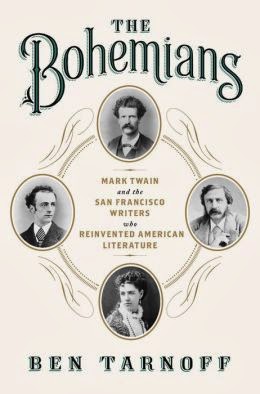 His new book is The Bohemians: Mark Twain and the San Francisco Writers Who Reinvented American Literature.
His new book is The Bohemians: Mark Twain and the San Francisco Writers Who Reinvented American Literature.Recently I asked Tarnoff about what he was reading. His reply:
Writing a book destroys your life. It consumes all the time allotted for it, and everything else besides. All those hours you had hoped to spend doing normal human things like socializing and cooking and exercising must be sacrificed to the hungry monster that lives inside every manuscript. And if you manage to pry yourself away from your desk and actually do something recreational, your ability to enjoy it will always run up against one recurring thought: I should be working on my book.View the trailer for The Bohemians, and visit Ben Tarnoff's website.
Under these conditions, the idea of reading for pleasure is absurd. A writer reading a book while also trying to write one is either doing research or procrastinating or looking for inspiration or sizing up competitors. Pleasure rarely enters the picture. Writing has made me a terrible reader: distractible, impatient, nit-picky, guilt-ridden. But every now and then, I stumble on a book that's so perfectly keyed to what I need at that particular moment that everything else falls away.
Lytton Strachey's Eminent Victorians is one of those books. I bought it at Grand Central Station one day after walking over from the New York Public Library, where I was writingThe Bohemians. Strachey's book is made up of short biographies of four major figures of Victorian-era Britain: Cardinal Manning, Florence Nightingale, Thomas Arnold, and General Gordon. He cuts so deeply into each character that you almost feel like you're living inside of them. He also manages to write with such wit and authority, you’d follow him down any digression, just for the pleasure of listening to his voice.
In his preface, Strachey presents a manifesto of sorts for how to write history. He lambasts the biographers of his time for producing unwieldy volumes full of “ill-digested masses of material,” and condemns “their slipshod style, their tone of tedious panegyric, their lamentable lack of selection.” He wants biographers to write more concisely and more absorbingly—to aim for “a brevity which excludes everything that is redundant and nothing that is significant.” I thought of Strachey’s words often while writing The Bohemians, as I endeavored to boil down my own masses of material into a digestible, delectable reduction.
--Marshal Zeringue




